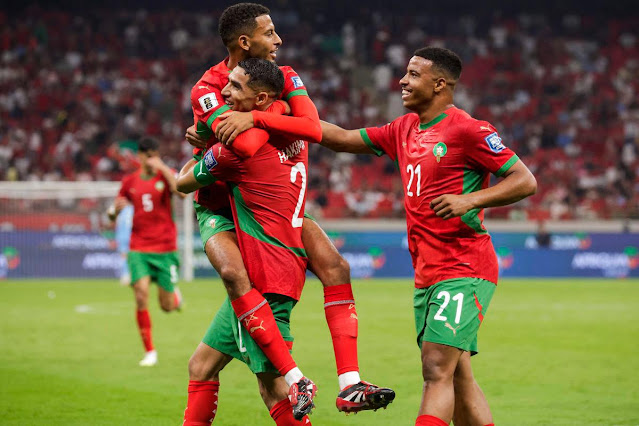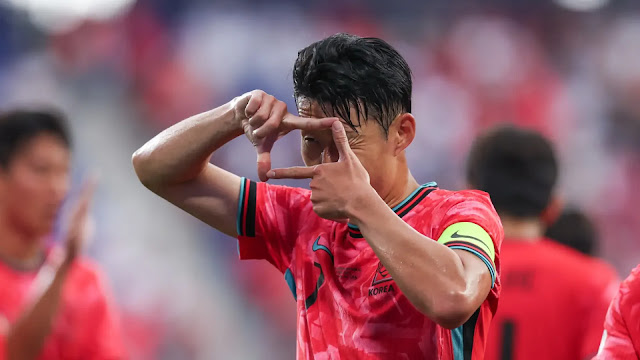In a historic moment for African football, Morocco has etched its name in the annals of the sport by becoming the first African nation to secure qualification for the 2026 FIFA World Cup, following a commanding victory over Niger Republic. This monumental achievement not only underscores Morocco’s growing dominance in African football but also highlights the nation’s remarkable journey in international competitions. The Atlas Lions, as the Moroccan national team is fondly called, showcased their prowess with a clinical performance, defeating Niger Republic and cementing their place in the global football spectacle set to be co-hosted by the United States, Canada, and Mexico. This article delves into the details of Morocco’s qualification, the significance of their achievement, the match against Niger Republic, and the broader implications for African football.
The Road to Qualification: Morocco’s Unwavering Ambition
Morocco’s qualification for the 2026 World Cup is the culmination of years of strategic planning, investment in football infrastructure, and a relentless pursuit of excellence. The Atlas Lions have been a force to reckon with in recent years, with their standout performance at the 2022 FIFA World Cup in Qatar serving as a testament to their growing stature. In Qatar, Morocco made history as the first African nation to reach the semi-finals of the World Cup, defeating powerhouse teams like Belgium, Spain, and Portugal before falling to France. That remarkable run captured the hearts of football fans across the continent and beyond, signaling Morocco’s arrival as a global football contender.
The qualification campaign for the 2026 World Cup, which will feature an expanded format with 48 teams, provided Morocco with an opportunity to build on their Qatar success. Drawn into a relatively manageable group in the African qualifiers, Morocco faced opponents including Niger Republic, Tanzania, and Zambia. Under the guidance of coach Walid Regragui, who has been instrumental in transforming the team into a cohesive and tactically astute unit, Morocco approached the qualifiers with confidence and determination. Their campaign was characterized by disciplined performances, attacking flair, and a solid defensive structure, all of which were on display in their decisive match against Niger Republic.
The Match: Morocco vs. Niger Republic
The match that sealed Morocco’s qualification took place at the Stade de Marrakech, a venue that has become a fortress for the Atlas Lions. With a passionate home crowd behind them, Morocco entered the game as overwhelming favorites against Niger Republic, a team that, while resilient, lacks the depth and experience of their North African counterparts. The Atlas Lions wasted no time asserting their dominance, controlling possession and creating numerous scoring opportunities from the outset.
The first goal came in the 23rd minute, courtesy of a well-executed move involving Morocco’s talismanic midfielder, Hakim Ziyech. The former Chelsea star, known for his vision and creativity, delivered a pinpoint pass to striker Youssef En-Nesyri, who calmly slotted the ball past Niger’s goalkeeper. En-Nesyri’s goal set the tone for the match, as Morocco continued to press forward with intent. The Atlas Lions’ attacking trio of Ziyech, En-Nesyri, and Sofiane Boufal consistently troubled Niger’s defense with their pace, movement, and interplay.
Niger Republic, to their credit, attempted to mount a response, relying on counter-attacks and set-pieces to threaten Morocco’s goal. However, the Moroccan defense, marshaled by captain Romain Saïss and goalkeeper Yassine Bounou, remained resolute. Bounou, who earned global acclaim for his heroics in Qatar, was rarely tested but made a crucial save in the first half to deny Niger an equalizer.
The second half saw Morocco double their lead, with young star Abde Ezzalzouli scoring a spectacular goal in the 67th minute. The Barcelona winger, who has emerged as one of Morocco’s brightest prospects, showcased his flair with a curling shot from the edge of the box that left Niger’s goalkeeper with no chance. The goal sparked wild celebrations among the home fans, who sensed that qualification was all but secured.
Despite Niger’s efforts to claw their way back into the game, Morocco’s tactical discipline and superior quality shone through. The Atlas Lions maintained control until the final whistle, securing a 2-0 victory that confirmed their place in the 2026 World Cup. The win was not only a testament to Morocco’s on-field brilliance but also a reflection of their ability to perform under pressure in front of their expectant supporters.
The Significance of Morocco’s Achievement
Morocco’s qualification as the first African nation for the 2026 World Cup carries profound significance for several reasons. Firstly, it underscores the country’s rapid rise as a footballing powerhouse. Over the past decade, Morocco has invested heavily in developing its football ecosystem, from grassroots academies to professional leagues. The Mohammed VI Football Academy, one of the most advanced training facilities in Africa, has played a pivotal role in nurturing young talent, producing players who are now starring for top European clubs and the national team.
Secondly, Morocco’s early qualification sends a strong message to the rest of the continent. Africa has long been regarded as an underdog in global football, with its teams often struggling to compete with the traditional powerhouses of Europe and South America. However, Morocco’s performances in recent years, coupled with their historic qualification, challenge this narrative. The Atlas Lions have shown that African teams can compete at the highest level, blending technical skill, physicality, and tactical acumen.
Moreover, Morocco’s success is a source of pride for the entire African continent. Football is a unifying force in Africa, transcending borders, languages, and cultures. The Atlas Lions’ achievements inspire young players across the continent to dream big and believe that they too can compete on the global stage. Morocco’s qualification is likely to galvanize other African nations to raise their standards and invest in their football programs as they vie for the remaining World Cup spots.
The Broader Context: Africa’s Growing Presence in Global Football
The 2026 World Cup will be a landmark event for African football, as the continent is expected to have an increased number of slots due to the tournament’s expanded format. FIFA’s decision to increase the number of participating teams to 48 has opened the door for more African nations to showcase their talent on the world stage. Currently, Africa is allocated nine direct qualification spots, with the possibility of a tenth through an intercontinental playoff. This expansion represents a significant opportunity for African football to assert itself and build on the momentum created by teams like Morocco.
Morocco’s qualification sets the tone for what promises to be a competitive qualification campaign across the continent. Other African heavyweights, such as Nigeria, Senegal, Algeria, and Cameroon, are expected to vie for qualification, each bringing their unique strengths to the table. Nigeria, with its wealth of talent playing in top European leagues, remains a perennial contender, while Senegal, the reigning African champions, will look to replicate their success from the 2022 World Cup. Algeria, known for their technical prowess, and Cameroon, with their storied World Cup history, are also likely to be in the mix.
However, the road to qualification is fraught with challenges. The African qualifiers are notoriously unpredictable, with smaller nations often causing upsets against their more fancied opponents. Teams like Cape Verde, Burkina Faso, and Mali have shown in recent years that they are capable of competing with the continent’s giants, adding an element of intrigue to the qualification process. Morocco’s early qualification serves as a benchmark for other African teams, raising the bar for performance and professionalism.
Morocco’s Preparations for 2026: Building on a Legacy
With their qualification secured, Morocco now has the luxury of time to prepare for the 2026 World Cup. Coach Walid Regragui, who has been hailed as a master tactician, will use this period to fine-tune his squad and integrate new talent into the team. The Atlas Lions boast a blend of experienced players and emerging stars, giving Regragui a wealth of options as he builds a squad capable of competing with the world’s best.
Key to Morocco’s success will be their ability to maintain the core of their 2022 World Cup team while introducing fresh faces. Players like Hakim Ziyech, Youssef En-Nesyri, and Sofyan Amrabat remain integral to the team’s success, bringing leadership and quality to the squad. At the same time, young talents like Abde Ezzalzouli and Bilal El Khannouss, who are making waves in Europe, represent the future of Moroccan football. Regragui’s challenge will be to strike a balance between experience and youth, ensuring that the team remains cohesive and competitive.
Off the pitch, Morocco’s football federation is likely to ramp up its preparations for the World Cup. This includes organizing high-profile friendly matches against top international teams to test the Atlas Lions’ mettle. Morocco’s success in Qatar was partly attributed to their rigorous preparation, which included competitive friendlies and a focus on team bonding. A similar approach is expected in the lead-up to 2026, with the goal of ensuring that the team is in peak condition when the tournament kicks off.
The Global Stage: Morocco’s Ambitions for 2026
As the first African nation to qualify for the 2026 World Cup, Morocco will carry the hopes of a continent when they take to the field in North America. The Atlas Lions have already proven that they can compete with the best, and their performances in Qatar have earned them respect from opponents and fans alike. In 2026, Morocco will aim to go one step further, with the ultimate goal of winning the World Cup—a feat that no African nation has yet achieved.
The expanded format of the 2026 World Cup presents both opportunities and challenges for Morocco. With more teams in the tournament, the competition will be fiercer than ever, but it also means that Morocco will have a greater chance of progressing deep into the knockout stages. The Atlas Lions’ ability to adapt to different playing styles and their resilience under pressure will be key to their success.
Moreover, Morocco’s qualification is likely to have a lasting impact on the country’s footballing culture. The Atlas Lions’ success has already inspired a new generation of players and fans, and their participation in the 2026 World Cup will further elevate the sport’s popularity in Morocco. The country’s vibrant footballing infrastructure, coupled with its passionate fan base, positions Morocco as a potential powerhouse in global football for years to come.
Challenges and Expectations for African Football
While Morocco’s qualification is a cause for celebration, it also highlights the challenges facing African football as a whole. Despite the continent’s immense talent pool, African teams have historically struggled to translate their potential into consistent success on the global stage. Issues such as inadequate infrastructure, limited funding, and administrative inefficiencies have often hampered the development of football in many African countries.
Morocco’s success serves as a model for other African nations to emulate. The country’s investment in youth development, professional leagues, and coaching education has paid dividends, creating a sustainable pipeline of talent. Other African nations will need to adopt similar strategies to compete at the highest level. This includes securing sponsorships, improving stadium facilities, and fostering partnerships with international clubs and organizations.
Furthermore, the unity and discipline displayed by Morocco’s national team highlight the importance of strong leadership and a clear vision. Coach Walid Regragui’s ability to instill a sense of purpose and identity in his players has been a key factor in Morocco’s success. Other African teams will need to cultivate similar leadership structures to maximize their potential.
The Road Ahead: Africa’s Quest for World Cup Glory
As Morocco prepares for the 2026 World Cup, the rest of Africa will be watching closely, eager to join them on the global stage. The qualification campaign is far from over, and several African nations are still in contention for the remaining spots. The coming months will see intense battles across the continent, as teams fight for the opportunity to represent Africa in North America.
For Morocco, the focus will now shift to building a team capable of making history once again. The Atlas Lions have already shown that they can compete with the best, and their qualification for 2026 is a testament to their talent, determination, and ambition. As the first African nation to secure their place in the tournament, Morocco carries the hopes of a continent and the dreams of millions of fans.
In conclusion, Morocco’s qualification for the 2026 World Cup is a landmark achievement that reverberates far beyond the borders of the North African nation. It is a triumph of hard work, vision, and resilience, and it sets the stage for what promises to be an exciting chapter in African football. As the Atlas Lions prepare to roar in North America, they carry with them the pride of a continent and the belief that they can achieve the impossible. For Morocco, the journey to 2026 is not just about competing—it’s about making history.






